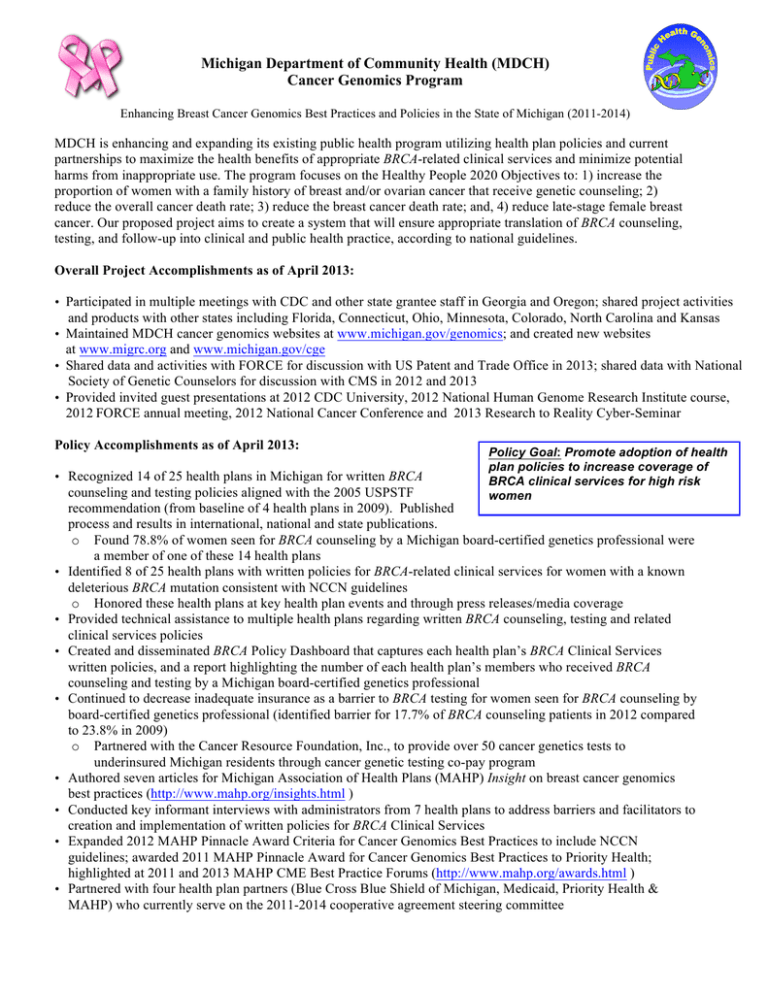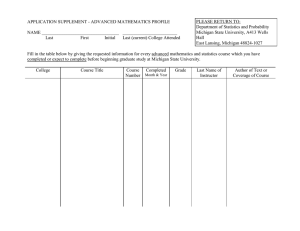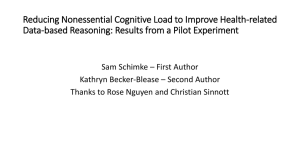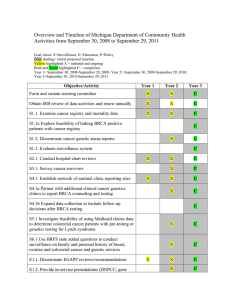Michigan Department of Community Health (MDCH) Cancer Genomics Program
advertisement

Michigan Department of Community Health (MDCH) Cancer Genomics Program Enhancing Breast Cancer Genomics Best Practices and Policies in the State of Michigan (2011-2014) MDCH is enhancing and expanding its existing public health program utilizing health plan policies and current partnerships to maximize the health benefits of appropriate BRCA-related clinical services and minimize potential harms from inappropriate use. The program focuses on the Healthy People 2020 Objectives to: 1) increase the proportion of women with a family history of breast and/or ovarian cancer that receive genetic counseling; 2) reduce the overall cancer death rate; 3) reduce the breast cancer death rate; and, 4) reduce late-stage female breast cancer. Our proposed project aims to create a system that will ensure appropriate translation of BRCA counseling, testing, and follow-up into clinical and public health practice, according to national guidelines. Overall Project Accomplishments as of April 2013: Participated in multiple meetings with CDC and other state grantee staff in Georgia and Oregon; shared project activities and products with other states including Florida, Connecticut, Ohio, Minnesota, Colorado, North Carolina and Kansas • Maintained MDCH cancer genomics websites at www.michigan.gov/genomics; and created new websites at www.migrc.org and www.michigan.gov/cge • Shared data and activities with FORCE for discussion with US Patent and Trade Office in 2013; shared data with National Society of Genetic Counselors for discussion with CMS in 2012 and 2013 • Provided invited guest presentations at 2012 CDC University, 2012 National Human Genome Research Institute course, 2012 FORCE annual meeting, 2012 National Cancer Conference and 2013 Research to Reality Cyber-Seminar • Policy Accomplishments as of April 2013: • • • • • • • • • Policy Goal: Promote adoption of health plan policies to increase coverage of BRCA clinical services for high risk women Recognized 14 of 25 health plans in Michigan for written BRCA counseling and testing policies aligned with the 2005 USPSTF recommendation (from baseline of 4 health plans in 2009). Published process and results in international, national and state publications. o Found 78.8% of women seen for BRCA counseling by a Michigan board-certified genetics professional were a member of one of these 14 health plans Identified 8 of 25 health plans with written policies for BRCA-related clinical services for women with a known deleterious BRCA mutation consistent with NCCN guidelines o Honored these health plans at key health plan events and through press releases/media coverage Provided technical assistance to multiple health plans regarding written BRCA counseling, testing and related clinical services policies Created and disseminated BRCA Policy Dashboard that captures each health plan’s BRCA Clinical Services written policies, and a report highlighting the number of each health plan’s members who received BRCA counseling and testing by a Michigan board-certified genetics professional Continued to decrease inadequate insurance as a barrier to BRCA testing for women seen for BRCA counseling by board-certified genetics professional (identified barrier for 17.7% of BRCA counseling patients in 2012 compared to 23.8% in 2009) o Partnered with the Cancer Resource Foundation, Inc., to provide over 50 cancer genetics tests to underinsured Michigan residents through cancer genetic testing co-pay program Authored seven articles for Michigan Association of Health Plans (MAHP) Insight on breast cancer genomics best practices (http://www.mahp.org/insights.html ) Conducted key informant interviews with administrators from 7 health plans to address barriers and facilitators to creation and implementation of written policies for BRCA Clinical Services Expanded 2012 MAHP Pinnacle Award Criteria for Cancer Genomics Best Practices to include NCCN guidelines; awarded 2011 MAHP Pinnacle Award for Cancer Genomics Best Practices to Priority Health; highlighted at 2011 and 2013 MAHP CME Best Practice Forums (http://www.mahp.org/awards.html ) Partnered with four health plan partners (Blue Cross Blue Shield of Michigan, Medicaid, Priority Health & MAHP) who currently serve on the 2011-2014 cooperative agreement steering committee Education Accomplishments in as of April 2013: • • • • • • Education Goal: Increase health care provider knowledge and use of BRCA clinical practices according to national best-practice guidelines Authored bi-monthly articles for the MCC Update newsletter on breast cancer genomics (www.michigancancer.org ) Distributed over 15,000 MDCH Cancer Family History Guides to assist providers in identifying high risk patients for referral to genetics specialist Created survey to be disseminated by major Michigan health plan to relevant primary care providers to measure awareness, knowledge, and appropriate use of national guidelines for BRCA counseling and testing referrals Partnered with NCHPEG, Oregon, Georgia and Florida to create BRCA CME module for primary care providers Provided in-service presentations on BRCA-related services at several Michigan hospitals and universities Presented invited plenary sessions at the 2012 Michigan Academy of Family Physicians annual conference; 2012 American Cancer Society-Great Lakes conference; 2012 Michigan Association of Physician Assistants conference; 2012 Intertribal Council of Michigan Annual Cancer Program; and, 2013 Michigan Society of Hematology and Oncology Nurse Retreat Surveillance Accomplishments as of April 2013: Surveillance Goal: Expand • • • • • • • • Expanded BRCA clinical network of all Michigan board-certified surveillance of BRCA clinical cancer genetic professionals to include 15 clinics overall; captured practices BRCA genetic counseling and testing information on over 10,300 patients. Data revealed: o An increased number of patients seen for BRCA counseling by a board-certified genetics professional each year (including the number meeting USPSTF and NCCN risk evaluation criteria) o Top three referring provider types to board-certified genetic professionals for BRCA counseling are surgery, oncology and OB/GYN; increased primary care provider referrals from 2011 to 2012 o Increased statewide use of specific BRCA tests beyond those ordered by board-certified professionals when Michigan BRCA clinical network data were compared with BRCA testing data received from Myriad Genetics, Inc. as follows: increased comprehensive BRCA testing by 72.2% from 2008-2011 (33.7% of total comprised by board-certified genetic professionals); increased BART testing by 370.9%, single site by 12.1%, and Ashkenazi Jewish three sites by 4.4% from 2008-2011 (54.1%-61.7% provided by boardcertified genetic professionals in 2011) Analyzed Michigan Cancer Surveillance Program and mortality data o Continued to demonstrate decreased mortality for ovarian cancer and breast cancer at a young age Submitted a ‘user story’ involving the BRCA database in the Public Health Reporting Initiative, organized under the Office of the National Coordinator for Health IT in 2011; served as current member of the Stage 3 Sprint workgroup creating an implementation guide for public health reporting Identified over 200 cases appropriate for BRCA counseling through four local MSCP cancer registries; providers of these cases to receive targeted educational information; identified four local cancer genetics providers who will serve as a resource for local providers o Co-authored blog (with Connecticut) for CDC Office of Public Health Genomics in 2013 Analyzed 2011-2012 phone survey involving female patients from 8 cancer genetics clinics who were identified with a BRCA known deleterious mutation or who were found to be a BRCA true negative to determine impact of BRCA testing results on follow-up health behavior and other factors Analyzed 2007-2009 Michigan Cancer Surveillance Program mandatory family history variables for breast cancer and ovarian cancer o Creating process for quality improvement of family history reporting with cancer registry staff Created protocol for surveillance projects examining follow-up care in patients covered by Blue Cross Blue Shield of Michigan and Priority Health who had BRCA testing Placed five 2012 Michigan BRFS questions on family history of breast and ovarian cancer and BRCA counseling and testing being asked to Michigan female adult residents o Analyzed results of 2011 Michigan BRFS questions and found 10.4% of Michigan adult women have a family history of breast and/or ovarian cancer that met selected USPSTF criteria (7.0% of Michigan adults met one of a select number of NCCN criteria for breast/ovarian cancer risk assessment); of those meeting USPSTF and/or NCCN criteria, 17.7-27.6% had at least one or more family members who had received genetic counseling for breast and ovarian cancer




